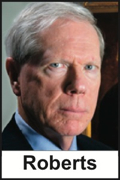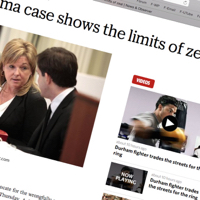Rascals case in brief
In the beginning, in 1989, more than 90 children at the Little Rascals Day Care Center in Edenton, North Carolina, accused a total of 20 adults with 429 instances of sexual abuse over a three-year period. It may have all begun with one parent’s complaint about punishment given her child.
Among the alleged perpetrators: the sheriff and mayor. But prosecutors would charge only Robin Byrum, Darlene Harris, Elizabeth “Betsy” Kelly, Robert “Bob” Kelly, Willard Scott Privott, Shelley Stone and Dawn Wilson – the Edenton 7.
Along with sodomy and beatings, allegations included a baby killed with a handgun, a child being hung upside down from a tree and being set on fire and countless other fantastic incidents involving spaceships, hot air balloons, pirate ships and trained sharks.
By the time prosecutors dropped the last charges in 1997, Little Rascals had become North Carolina’s longest and most costly criminal trial. Prosecutors kept defendants jailed in hopes at least one would turn against their supposed co-conspirators. Remarkably, none did. Another shameful record: Five defendants had to wait longer to face their accusers in court than anyone else in North Carolina history.
Between 1991 and 1997, Ofra Bikel produced three extraordinary episodes on the Little Rascals case for the PBS series “Frontline.” Although “Innocence Lost” did not deter prosecutors, it exposed their tactics and fostered nationwide skepticism and dismay.
With each passing year, the absurdity of the Little Rascals charges has become more obvious. But no admission of error has ever come from prosecutors, police, interviewers or parents. This site is devoted to the issues raised by this case.
On Facebook
Click for earlier Facebook posts archived on this site
Click to go to
Today’s random selection from the Little Rascals Day Care archives….
Click for earlier Facebook posts archived on this site
Click to go to
Today’s random selection from the Little Rascals Day Care archives….
Did prosecutors sell out for name recognition?
 Nov. 12, 2012
Nov. 12, 2012
“It is not conceivable that any of the prosecutors (in cases such as Little Rascals) believed a word of the charges responsible for ruining the lives of so many people. The cases were brought for one reason alone: to gain name recognition for the prosecutors.”
– From “The Tyranny of Good Intentions: How Prosecutors and Bureaucrats Are Trampling the Constitution in the Name of Justice” by Paul Craig Roberts and Lawrence M. Stratton (2008)
Could prosecutors really have sold their souls (not to mention their public trust) for mere “name recognition”? Or did their lust for guilty verdicts blind them to the obvious?
Most days, the latter seems more likely to me. Or perhaps a hybrid….
Indisputably, however, career benefits did attach to trumpeting from the courthouse steps that you’ve sent away Bob Kelly for 12 consecutive life sentences.
Prosecutors’ dream: Day-care den of evil-doers
Nov. 28, 2012
“There is nothing that makes us feel so good as the idea that someone else is an evil-doer.”
– Robert Lynd, Irish essayist (1879-1949)
The average Edentonian may have been too fearful and confused to feel good about demonizing the Edenton Seven – ah, but what a rush it must have given the cocksure therapists and prosecutors!
Sex-abuse journalism raises ‘strange question’
 Nov. 9, 2012
Nov. 9, 2012
“Did I recognize that child sex abuse existed and was a serious problem? reporters would ask. A strange question, that. The discussion of no other crime would require such a disclaimer. Journalists who have written about false murder charges are seldom asked to provide reassurance that they know murder is a bad thing, and it really happens.”
– From “No Crueler Tyrannies: Accusations, False Witness and Other Terrors of Our Times” by Dorothy Rabinowitz (2003)
Separate disciplinary panel needed for prosecutorial excesses

newsobserver.com
Online version of editorial.
Jan. 20, 2016
“The Jan. 15 editorial ‘The limits of zeal’ contrasted the penalty given Christine Mumma with the absence of rebuke to prosecutors for the ‘massive failure’ that kept her client wrongfully imprisoned for more than 36 years.
“It is not enough simply to point out this shameful disparity. The public embarrassment resulting from the hearing should move the North Carolina State Bar to empower a separate disciplinary panel to deal only with prosecutorial excesses. Such a panel would not lack for business.”
– From “A Panel for Prosecutors,” my letter to the editor of the News & Observer (Jan. 19) (text cache)
![]()











0 CommentsComment on Facebook